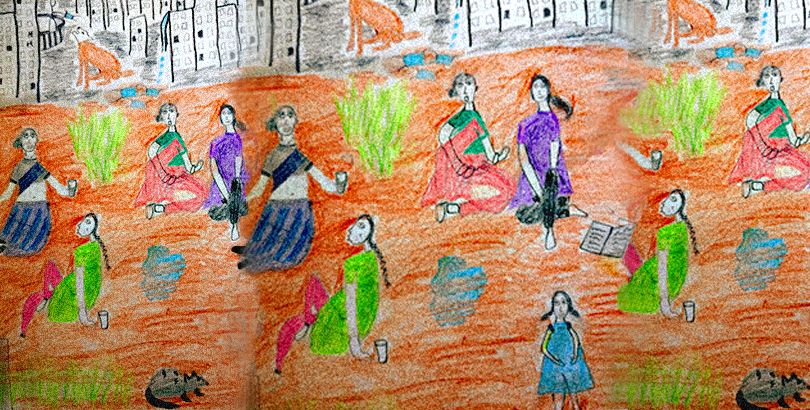THE CURSE

Angarika G
“Hello?”
“Didi abhi baat nahi kar sakti, badme phone karti hun.”
“Hello?”
“Didi, I can’t talk right now, I’ll call later.”
She hung up. It had been 3 weeks since I had been trying to get in touch with Suman. Each time, she cut the phone hurriedly, as though afraid of being caught. I visited her house in Chinappa Layout, Mahadevpura, only to find a lock on the door. When I asked around, her neighbors told me she had gotten a full time job. Considering she had lost all her work during the first lockdown, this was good news. Then why was she so tense on the phone?
Two weeks later, a video call from Suman. The signal wasn’t very strong, and she appeared like a blur. Since our last meeting, she looked older. Softly she asked, “Didi, kya aap mil sakte hai? Main apne ghar par hoon..” “Can you meet me? I am in my house.”
Suman had a liking for bright red lipstick, but today, her face was pale and drawn. We sat down with a cup of tea. She said she would have preferred to work in the day, and return to her family at night. But her employers are paranoid about her transmitting the virus and insisted that she stay with them.
Suman is not allowed to talk on the phone. If the ‘madam’ sees her on the phone, she is accused of being lazy. “Isliye main aapse baat nahi kar payi. Mushkil se apne bachon se se baat kar paati hun.” “That’s why I haven’t been able to speak to you. I can barely speak to my children.”
Even though she is speaking clearly, her voice is full, like there is something more she wants to share.
“Didi, aap theek ho?”
“Are you okay?”
Before she can respond, we are joined by Radha and Nasima, who live nearby. It is late evening and everyone’s doors are always open, children running from one home to another, stray cats fighting, and people filling water: unlike the apartment complexes around, with curtains drawn and silhouettes of lonely figures standing on the terrace, looking down.
Kaam toh pure din karna padta hai. Pehle bas subah aur shaam, do ghante ke liye kaam karti thi. Abh toh dophere ke 1 baje ko bhi wo chai maang lete hai. Iske liye toh zyaada paisa nahi milta!


Neelam sits next to me laughing, “Kya didi, aaj chawal nahi laye hamare liye?” “What happened, you didn’t bring rice for us today?” I first met Radha, Nasima and Suman, along with other workers in Chinappa Layout, during the first lockdown. I did not know the area, hidden away amidst the IT industrial corridor, along the Whitefield main road. It was during weekly rounds of ration distribution that I became familiar with the workers who live there- construction workers, waste recyclers, domestic workers and security guards. When the lockdown eased, I continued visiting the area to find out how they are doing. We fell into a familiarity, but the jokes about me as the ‘ration didi’ never ceased, constantly reminding me of the tense circumstances under which we met: long afternoons spent distributing packets of food, and making uncomfortable decisions about how much ration would suffice for each family.
Radha used to work in 7 houses before the first lockdown hit, and now works in 2. Nasima is yet to resume work. Her family is dependent on her husband’s earnings as a worker in a supermarket nearby. I ask them what has changed in their lives. “Kuch nahi, ameer log ameer hai, aur hum idhar baithe hue hai!” “Nothing, the rich are still rich, and we’re just sitting around here. “ R laughs. Out of the 7 houses she used to work in, only two supported her financially during both lockdowns. A survey conducted by Domestic Workers’ Rights Union (DWRU), Bruhat Bangalore Gruhakarmika Sangha (BBGS), and Manegelasa Karmikara Union revealed that 90% of domestic workers lost their jobs during the first lockdown, and 45% were above the age of 50. In the wake of the second lockdown, the state government announced financial assistance of Rs. 2,000 for domestic workers. This is only a one time payment, and to be eligible, workers have to submit a tedious list of documents, including BPL cards, address proof and employment certificates- which proves quite difficult, particularly for migrant workers. Most of the domestic workers in Mahadevpura were not aware of the government scheme.
“Bachelors phir bhi thoda support kar lete hai. Bechare, woh bhi apne parivar se dur rah rahe hai, woh apna khayal nahi rakh paya! Toh woh bula lete hai, khana banane, kapde dhone.. Par jo parivar ke log hai, woh kamine hai. R shares matter of factly. Unko apne bache ka dar rehta hai. Ghar andar aane se pehle, bahar ke nale par humein haanth munh dhona padta hai. Humein mask pehna padta hai, lekin wo bina mask ghoomte hai! Hamare bache nahi hai kya?”
“Bachelor boys still support us. Poor things, they are away from their families, they don’t know how to take care of themselves. They call us to cook food, wash clothes. But the family people, they are the bastards. They are just concerned about their children. When I go to work, I have to first wash myself with water from a tap outside their house. She asks me to wear the mask, while they are just roaming around without a mask. I don’t have children or what? “
Naseema shares that she is bored. She came to Bangalore ten years ago, from her village in Gulbarga, and has been working since. She says her body isn’t used to lying around, being so idle. “Khane ko kuch nahi hai, nahi toh madame ki tarah moti ho jaati!” “There’s nothing to eat, otherwise I’d be as fat as the madame in the house!” I laugh, even as the irony of her joke strikes me. She is considering returning to her village. She and her husband live in one room. Out of boredom, they keep fighting. “Lekin kitna ladenge? Ek do ghanta muh phulakar baith lete hai, phir baat kar lete hai.” “But how much will we fight? We sit with our faces swollen for one or two hours, then we start talking again.”
Suman has fallen silent through this interaction. “Naukri ke baad woh zyaada serious ban gayi hai, badi aurat.” Radha jokes. “After her job, she’s become very serious, a big woman!” Suman doesn’t laugh. After finishing their tea, Radha and Naseema drift toward their homes. It is now late evening, there is dinner to be cooked, husbands and children to be fed.
“Didi batao na?” I turn to Suman.Her husband, a night security guard, has woken up from his nap and is hovering at the door, watching us. She must pack him his tiffin before he leaves for work.
Her eyes welled up with tears.
“Kaam shuru hone mein 3 hafte ho gaye the. Maine apne bache ko nahi dekha tha. Maine madam se pucha agar main 2-3 din ka time nikal kar, apne bache ko dekh saku. Madam pregnant thi. Jab maine ye pucha, woh chilane lagi. Gaali di. Unhone bola ki agar main apne ghar jau, toh phir mujhe waapis aane ki zaroorat nahi.” Maine kuch bola nahi…
“Phir kya hua?”
“Agle din, madam apne room mein thi, aur zor zor se roh rahi thi. Main kamre ke andar gayi, mujhe laga woh gir gayi thi. Maine dekha ki woh bathroom mein khadi hui thi, aur unke neeche khoon tha. Usne mujh par chilaya, idhar se nikal jao. Saab andar gaye, dekhne ke liye. Unka darwaza pure din bandh tha. Shaam ko wo nikli, maine chai banake unko diya. Unhone chai ko zameen par fek diya. Bola, ki tumhari wajah se mera bacha gir gaya hai. Tumne mujhe itna tension diya hai. Tumhari wajah se, woh mar gaya hai. Itna bolkar woh apne kamre mein waapis chali gayi.
“ It has been three weeks. I hadn’t seen my children so I asked the madam for leave for 1-2 days, so I could be with them. Madam was pregnant. When I asked, she began yelling. She abused me. She said if I wanted to go home so badly, I don’t need the job. I kept quiet then.
“Then?”
“The next morning, I could hear her crying loudly in the room. I rushed inside the room, I thought maybe she had fallen. I saw her standing in the bathroom, with blood on the floor. She screamed at me to leave the room. Her husband went inside, to see what had happened. The door to their bedroom remained closed all day. In the evening she came out, so I went to make her tea. She took the cup and threw the tea on the floor. She said, because of you, I have had a miscarriage. You cause me so much tension. Because of you, my child is dead. She went into the room and slammed the door.”
S turns away so I don’t see her tears.
“Didi mujhe laga ki usne mere upar shraap dala hai. Aisi cheezein kaun bolta hai? Main uski bache ki dekh baal karti hun, uske parivar ke liye khana banati hun, din raat kaam karti hun. Maine saab se pucha agar mein ghar ja sakti hun, unhone maan liya. Jab mein ghar pahunchi, mere bade bete ki tabyat theek nahi thi. Abhi bhi kisi tarah paise jodkar, ilaaj kara rahi hun.Phir gaon se phone aaya ki mere bhai ka accident hua hai. Maine kya galti ki? Usne mujhse aise kyun bola? Ab lagta hai jaise mere pure parivar par ek badal dhal gaya.”
“From that day on, I feel she has cursed me. Nothing is going right in my life. Who says this to someone else? I work day and night, I take care of her child, I feed her family… I asked her husband if I could return home, he agreed. When I came back, I found my older son had fallen ill. I am trying to get him medicine from the few savings we have left. Then I got a call from my village saying my brother had an accident. Why did she say this to me? What did I do wrong? I feel like a dark cloud has descended on my family.”
I didn’t know how to respond. How do you console someone who believes they have been cursed? And perhaps she was right. Listening to her, it struck me how precarious the position of a domestic worker is- oddly intimate, yet distant. She has a close knowledge of a family’s lifestyle, habits, temperaments. Their disagreements and tensions. She cleans their utensils, sweeps their floors, folds clothes, and takes care of their children. She works to take care of a family, while being away from her own. She might be privy to their secrets and frustrations. Alongside grueling physical labour, she has to learn to work around their moods.
Her husband gestures that he has to leave for work. S gathers herself and gets up. “Kya tum kaam par waapis jaogi? ” Kaam toh nahi chod sakti didi. Usne phone kara tha, bola ki kaam par waapis aao. Maine bol diya ki agar woh aise baat karegi, main waapis nahi jaungi. ”
“Will you go back to work?”
“I can’t leave the job. She told me to come back to work. I said if she speaks to me like this again, I won’t return.
***
I had read various reports/articles on the economic impact of the lockdown on domestic workers. My conversation with Suman revealed a different aspect, a darker side of violence, resentment and displaced anger. How easy it becomes to impose our frustrations onto someone else, because we can justify it as an economic transaction. Suman is a mother herself, and I sensed she was caught between sharing the sorrow of the miscarriage and horror at being branded the cause. It made me wonder about how fractured solidarities are between women- what could have been a shared experience between Suman and her employer- became a bitter contestation of caste and class. I spoke to Suman two weeks later. She was back at work. I could hear the sound of a child crying in the background. She said the situation was better after she threatened to leave work. She spends her days entertaining the child. She hasn’t been able to see her own family in 3 weeks, but she tells me she prays for their well being every night.
A survey conducted by Domestic Workers’ Rights Union (DWRU), Bruhat Bangalore Gruhakarmika Sangha (BBGS), and Manegelasa Karmikara Union revealed that 90% of domestic workers lost their jobs during the first lockdown, and 45% were above the age of 50.
How do you console someone who believes they have been cursed? And perhaps she was right. Listening to her, it struck me how precarious the position of a domestic worker is- oddly intimate, yet distant. She has a close knowledge of a family’s lifestyle, habits, temperaments. Their disagreements and tensions.
